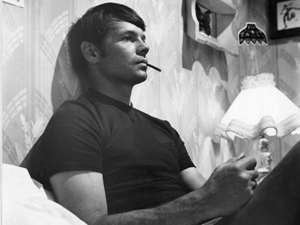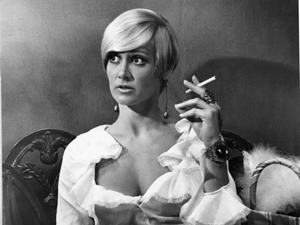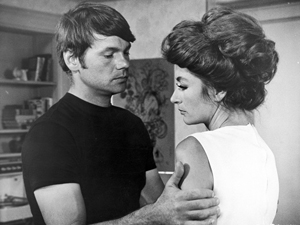Part of Sony's
Martini Movies* Collection
Martini Movies* Collection
Since Jacques Demy's Umbrellas of Cherbourg is one of my favorite films of all-time, more than any other Martini Movies release from Sony Pictures, Model Shop was the one I was looking forward to the most.
Yet, in the same token, I realized that sometimes when French New Wave directors journeyed to America the results were mixed as in the beautifully crafted but icy Francois Truffaut version of Fahrenheit 451. Thus, I fought the urge to tear open the Shop box and watched the other four works first to save Demy's for last.
With the refrain of Cherbourg's "I Will Wait for You" playing on repeat in my mind, I decided to follow the music's advice, even when it was overtaken by the soundtracks most immediately identifiable with Shop's leads such as the main theme of Claude Lelouch's A Man and a Woman with Anouk Aimee and the opening music of Kubrick's 2001: A Space Odyssey which starred Gary Lockwood.
Needless to say, given the talent involved including Five Easy Pieces screenwriter Carole Eastman who penned the film's English dialogue for main writer Demy, the expectations for Model Shop were at an all time high that went beyond pure French New Wave obsession. This is especially true when you realize that it is acknowledged as an English language follow-up to Anouk Aimee and Jacques Demy's breakthrough film Lola.
Although it doesn't compare to Demy's other movie, fortunately Model Shop isn't quite as coolly detached as Truffaut's Fahrenheit. Intriguingly Demy wanted to cast Harrison Ford as his leading man but Columbia assured him the film would be a box office failure since Ford didn't have the financial draw that he has today.
And despite Lockwood's All-American looks, he's a little too apathetic as our apathetic hero and doesn't really have the natural charm of Ford which makes me wonder if there's a screen test somewhere in existence since Ford would've been a unique choice that may have enhanced the film, aside from its clunky structure. Still it's curious that this detail has been revealed by IMDb, particularly considering the way the film meanders like an existential Vietnam era version of the movie Ford would later make with George Lucas and Francis Ford Coppola-- American Graffiti (another one of this reviewer's top ten favorites along with Cherbourg).
Like Cherbourg and a large majority of Demy's oeuvre, the movie's emphasis is on affairs of the heart and it's apparent right from the introduction to Lockwood's character George Matthews when he awakens from a dream about love that this will be the same focus in Model Shop. However, aside from the fact that he is matched with a blonde who shares his bed in the opening moments, we soon gather that true romance is not something he experiences with the dim-witted aspiring actress lover he's shacked up with played by Alexandra Hay.
Essentially a soulful yet aimless wanderer who'd studied architecture at Berkley, the twenty-six year old George Matthews is an impossible man to figure out for a good bulk of the film as he sets off to scrape together one hundred bucks from his friends to avoid the repossession of his car.
While those he interacts with as he drives around the streets of Los Angeles seem to have a more concrete handle on their life with work, music, and family, Lockwood is someone we realize never really knew what exactly it was he was after until he lights a cigarette for a beautiful stranger (Aimee) and impulsively follows her for the course of the film. However, unlike Richard Dreyfuss longing to track down the flirtatious Suzanne Somers in American Graffiti, Lockwood had no encouragement whatsoever from the woman he downright stalks before the term was in use.
Going as far as to follow her to her home, after failing to make a connection George catches sight of her one more time. Determined to be near the stranger, he visits her twice in her seedy work at the titular model shop where Aimee reprises her role as the former cabaret star Lola, now degraded to accepting the only position she can without a work permit by posing for nude photos as men pay twelve dollars to play photographer for fifteen minutes at a time.
Unable to chat with her the first time as he's thunderstruck by both her beauty and finding himself in such a place, Matthews returns later for another fifteen minutes sans photography and ready to speak as the clock ticks down not only at the Model Shop but also for the little time he has left before he's scheduled to respond to his draft notice and leave for Vietnam twenty-four hours later.
Despite the fact that you won't necessarily need to have seen Lola to find it somewhat unique, for those who have, it's well worth hunting down. New Wave references are sprinkled throughout (watch for a Breathless era Jean-Paul Belmondo photo) and the film continues the Lola storyline by incorporating photos as Aimee shares stories that recall the previous film and what has happened to her character Lola aka Cecile within the span of celluloid.
As a movie on its own, there's not much to this Model as it largely substitutes traditional storytelling conventions of plot and character motivation with California ambiance. And clearly Demy relishes in his tourist/outsider's perspective of Los Angeles, Beverly Hills, Malibu beach, seedy dives along Santa Monica Boulevard to capture it to breathtaking effect as both Lockwood and Aimee's characters genuinely find their surroundings beautiful which flies in the face of most attitudes regarding La La Land.
Filling it with wall to wall music from classical to period era tunes to the film's score that coincides with so many scenes of individuals in convertibles, Model Shop is meditative and stunning to look at to the point that like American Graffiti, when the characters leave their cars for buildings, we feel claustrophobic and ready to break free.
However, its slow tempo (a la Lost in Translation or the films of Antonioni) and unnatural, dense dialogue makes it hard for us to keep intrigued until the film's highly anticipated yet unsatisfying conclusion as the two people come together via a final romantic act that's alluring yet oddly devoid of chemistry. While it's a slight misfire, luckily it's one that's not nearly as plodding as some of the other movies made by directors who venture to the states and suffer in the translation to the English language like Wong Kar Wai's recent gorgeous oddity My Blueberry Nights.
Thus, Model Shop which has been finally released on DVD from Sony for the first time in its history will no doubt be of great interest to New Wave enthusiasts who (cue the Cherbourg theme) have been waiting to see it for many, many years.
*Note: Just what is a Martini Movie? Sony's statement: "No matter the decade, there's a place where icons, idols and the infamous flock for bottomless martinis and over-the-top trysts. One part top-shelf martini, two parts celluloid history and garnished with a hint of camp. Sit back and take in the scene with Sony Pictures Home Entertainment's Martini Movies." All titles released so far in the collection have never been available previously in the DVD format.
Text ©2009, Film Intuition, LLC; All Rights Reserved. http://www.filmintuition.com
Unauthorized Reproduction or Publication Elsewhere is Strictly Prohibited.


















